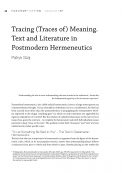Micropoetics and Video Games, or a Minimalistic Encomium to Short-sightedness
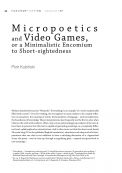
Wisława Szymborska’s poem “Wszystko” (Everything) is an example of a work exceptionally filled with content.[1] On a first reading, the text appears to many readers to be a simple reflection on semantics, the meaning of words, the boundaries of language – and, by implication, the boundaries of knowledge. (...)
Micropoetics and Its Contexts
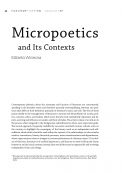
Contemporary polemics about the autonomy and function of literature are concentrated, speaking in the broadest terms and therefore naturally oversimplifying, between two positions that differ in their definition primarily of literature’s status and role. (...)
On the Silesian Micrological School (1999-2005). A Sprinkling of Reminiscences
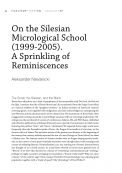
The Small, the Silesian, and the Black
These three adjectives are a kind of paraphrase of the memorable triad The Good, the Bad and the Ugly. I mention the title of Ennio Morricone’s hit soundtrack (from the Sergio Leone film) as a musical emblem of the “spaghetti western,” an Italian imitation of American cinema’s crowning genre, once regarded with indignation and later acknowledged as anticipating the anti-Western and the deconstruction of the classic form. (...)
“To look darkness. To subside”: From Micropoetics to Micropolitics and Back Again (On Method)
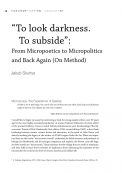
Microscopy: the Experience of Seeing
It’s like a set of split rings. You can fit any one of them into any other. Each ring or each plateau ought to have its own climate, its own tone or timbre.
Gilles Deleuze on the composition of A Thousand Plateaus[1]
I would like to begin my essay by mentioning a book for young people written over 60 years ago by the once highly esteemed popularizer of science Tadeusz Unkiewicz, the first editor of the journal Problemy. (...)






